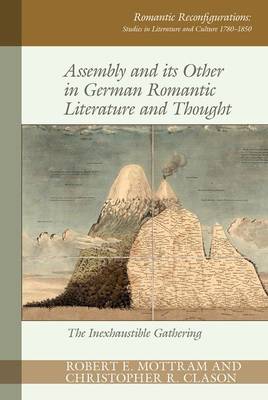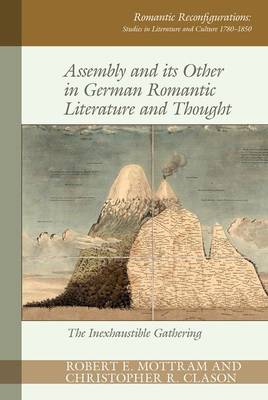
- Retrait gratuit dans votre magasin Club
- 7.000.000 titres dans notre catalogue
- Payer en toute sécurité
- Toujours un magasin près de chez vous
- Retrait gratuit dans votre magasin Club
- 7.000.0000 titres dans notre catalogue
- Payer en toute sécurité
- Toujours un magasin près de chez vous
Assembly and Its Other in German Romantic Literature and Thought
The Inexhaustible Gathering
Description
This collection of essays turns on a shift in Romantic studies from viewing wholeness as an absolute value to critiquing it as a limiting construction. Wholeness and its concomitant sense of harmony, rather than a natural given, is a construct that was assembled and disassembled, theorized and criticized, by diverse authors and artists in a wide variety of disciplines and socio-historical contexts, and instrumentalized for diverse purposes. The plurality of these constructions - that Goethe's Urpflanze, for example, is not synonymous with Friedrich Schlegel's universal progressive poetry - is but one manifestation of how "assembly" strives but fails to be absolute. The "other" of assembly referenced in the title suggests two divergent but inseparable tendencies: firstly, how a construction can take on the appearance of a natural given; and secondly, how assemblages of wholeness harbor within themselves their own principle of disarticulation. These two tendencies underlie the "inexhaustible" character of Romantic "gatherings". As a construction passes itself off as nature, the natural fails to account for itself as a whole. The scope of this volume encompasses the establishment, mapping, and interrogation of assembly and its other in German Romanticism through interdisciplinary studies on literature, aesthetics, philosophy, drama, music, synaesthesia, mathematics, science, and exploration.
List of contributors: Beate Allert, Frederick Burwick, Alexis B. Smith, Margaret Strair, Christina Weiler, Joshua Wilner.Spécifications
Parties prenantes
- Editeur:
Contenu
- Nombre de pages :
- 224
- Langue:
- Anglais
- Collection :
- Tome:
- n° 16
Caractéristiques
- EAN:
- 9781802077261
- Date de parution :
- 01-01-23
- Format:
- Livre relié
- Format numérique:
- Genaaid
- Dimensions :
- 156 mm x 234 mm
- Poids :
- 489 g

Les avis
Nous publions uniquement les avis qui respectent les conditions requises. Consultez nos conditions pour les avis.





